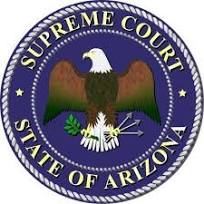References
Arizona Court Decision
IN THE SUPREME COURT OF THE STATE OF ARIZONA PLANNED PARENTHOOD ARIZONA, INC., SUCCESSOR-IN-INTEREST TO PLANNED PARENTHOOD CENTER OF TUCSON, INC.; LAURA CONOVER, PIMA COUNTY ATTORNEY,
Appellants,
v.
KRISTIN K. MAYES, ATTORNEY GENERAL OF THE STATE OF ARIZONA,
Appellee, URL of PDF.
Academic Analysis
Arizona Abortion Law if Roe v. Wade is Overturned – Guidance, Slade Smith JD, Kirin Goff, JD MA, University of Arizona, Zuckerman College of Public Health , Applied Health Policy Institute [PDF URL]
Old Curmudgeon’s Analysis
When the Supreme Court of the United States’ (SCOTUS) Dobbs Decision was decided on June 24, 2023 Arizona’s abortion law reverted to the existing law in effect prior to the Roe vs Wade decision (1973).
The pre-Roe v Wade abortion Arizona law was:
“In 1864, the First Legislative Assembly published a code of
laws governing the territory of Arizona. See Howell Code (1864). The
Howell Code established Arizona’s first criminal code, which included
constraints on abortion. In 1901, the Twenty-First Legislative Assembly
enacted a penal code reiterating the abortion law, dividing criminality
between people who facilitate abortions and women who solicit assistance
to procure an abortion. See Revised Statutes of Arizona, Penal Code §§ 234,
244 (1901). This language was adopted in whole in 1913, after Arizona
statehood. See Revised Statutes of Arizona, Penal Code § 273 (1913). In
1928, the Arizona Legislature codified abortion criminality in A.R.S.
§§ 13-211 to -213.”In 1864, the First Legislative Assembly published a code of
laws governing the territory of Arizona. See Howell Code (1864). The
Howell Code established Arizona’s first criminal code, which included
constraints on abortion. In 1901, the Twenty-First Legislative Assembly
enacted a penal code reiterating the abortion law, dividing criminality
between people who facilitate abortions and women who solicit assistance
to procure an abortion. See Revised Statutes of Arizona, Penal Code §§ 234,
244 (1901). This language was adopted in whole in 1913, after Arizona
statehood. See Revised Statutes of Arizona, Penal Code § 273 (1913). In
1928, the Arizona Legislature codified abortion criminality in A.R.S.
§§ 13-211 to -213.” op. cit. Court Decision
In 1971, Planned Parenthood Center of Tucson, Inc. sued the
Attorney General challenging the constitutionality of Arizona’s abortion
statutes under both the state and federal constitutions. op. cit.
In 1973, after Nelson upheld § 13-211’s constitutionality, the United States Supreme Court recognized a federal constitutional right to an abortion in Roe v Wade. This new right established by Roe was inconsistent with § 13-211, so the Arizona Court of Appeals revisited the issue in Marks, this time holding the statute unconstitutional because of Roe and enjoining enforcement1 of § 13-211. Nelson, 19 Ariz. App. at 152. op. cit.
With the Dobbs decision this enjoining enforcement became moot and the 1928 A.R.S. §§ 13-211 to -213 became Arizona law again.
The Bottom Line
Arizona’s legislature had 49 years in which they could have crafted an Arizona abortion law that codified Roe, but they didn’t. As a result of SCOTUS reversal Roe v Wade Arizona’s abortion law will revert to the 1928 A.R.S. §§ 13-211 to -213 on May 1st. The Arizona Supreme Court also approved a ballot measure for a constitutional amendment to protect abortion right.
The measure: “The Arizona Right to Abortion Initiative may appear on the ballot in Arizona as an initiated constitutional amendment on November 5, 2024.
The ballot initiative would establish the fundamental right to abortion that the state of Arizona may not interfere with before the point of fetal viability (defined as the point of pregnancy when there is significant chance of the survival of the fetus outside of the uterus without the application of extraordinary medical measures) unless justified by a compelling state interest (defined as a law or regulation enacted for the limited purpose of improving or maintaining the health of the individual seeking abortion care that does not infringe on that individual’s autonomous decision making) [Ballotpedia]
Thus the intent of Dobbs to return control to the state has been achieved. From May 1st to November 5th the 1928 Abortion law 2 will be in effect, and Arizona voter will determine the law going forward.

